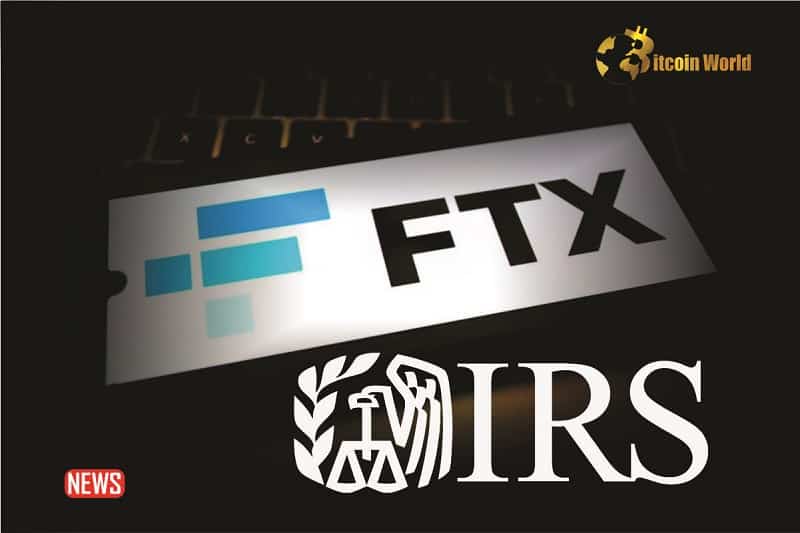The FTX saga continues to twist and turn, and the latest chapter involves a hefty tax bill from the IRS. Imagine waiting to recover your funds from the collapsed crypto exchange, only to find out a massive $24 billion tax claim is standing in the way! That’s the reality facing FTX users as the bankrupt exchange battles with the Internal Revenue Service over what it claims are outrageous tax demands. Let’s dive into this developing situation and understand what it means for everyone involved.
What’s the Fuss About? FTX, IRS, and a $24 Billion Question Mark
FTX, once a leading name in the crypto exchange world, is now entangled in a complex bankruptcy process following its dramatic downfall. Adding fuel to the fire, the IRS has presented a staggering claim for unpaid taxes, initially hitting FTX with a $44 billion demand, later reduced to $24 billion. FTX, however, is vehemently contesting this claim, stating they owe absolutely nothing. This disagreement isn’t just about numbers on paper; it directly impacts the recovery of funds for FTX users who are already reeling from the exchange’s collapse.
Here’s a quick rundown of the key points:
- Massive Tax Claim: The IRS is demanding $24 billion in unpaid taxes from FTX, significantly down from their initial $44 billion claim.
- FTX’s Stance: FTX argues it owes nothing, stating it never generated profits anywhere near the claimed tax amount.
- User Fund Delay: FTX claims this IRS demand is hindering the process of returning funds to affected users and creditors.
- Show Us the Math: FTX lawyers are requesting the IRS to provide a detailed breakdown of how they arrived at the $24 billion figure.
Why Does the IRS Think FTX Owes Billions?
The IRS’s claim covers income taxes, employment taxes, and penalties from 2018 to 2022. While the exact calculation methods remain unclear, the IRS asserts that these are estimations based on their audit and are presumed correct unless FTX proves otherwise. They cite ongoing audits and information gathering as reasons for the fluctuating figures, initially $44 billion, then $43 billion, and now $24 billion.
The IRS argues that even though the figure is still under audit, FTX needs to demonstrate why they shouldn’t be liable for this substantial amount. This is where the core of the dispute lies – the burden of proof.
FTX’s Counter-Argument: “Alice in Wonderland” Tax Claims?
FTX isn’t backing down. They’ve labeled the IRS’s claim as “absurd and meritless,” going so far as to call the IRS’s arguments an “Alice in Wonderland argument.” Their core arguments are:
- No Profits, No Taxes: FTX insists it operated at a loss during its short lifespan and never distributed dividends or earnings. They argue that the sheer scale of the tax claim is illogical given their financial performance.
- Victims Pay the Price: FTX lawyers emphasize that any funds taken by the IRS would directly reduce the pool of assets available for distribution to FTX’s creditors, primarily its users. They see the IRS claim as directly harming the victims of FTX’s collapse.
- Cooperation and Transparency: FTX highlights its cooperation with the IRS, stating they’ve responded to over 2,300 information requests and provided almost all requested documents. They believe they’ve been transparent and compliant.
See Also: Binance Launched Its 40th Launchpool Project, the Fusionist (ACE) Token
Timeline of the Tax Tussle: From $44 Billion Downwards
The IRS’s tax claim against FTX has been a moving target, to say the least:
- April: IRS files initial claims for a whopping $44 billion.
- September: The amount is slightly adjusted downwards to $43 billion.
- November: A significant reduction to $24 billion.
- Ongoing: The IRS states the $24 billion is still not final as the audit continues.
This fluctuating figure raises questions about the basis of the IRS’s calculations and further fuels FTX’s skepticism about the legitimacy of the claim.
See Also: US Court Orders Crypto Exchange FTX To Sell $873M Of Assets To Repay Creditors
What’s Next? Victims in Limbo
FTX is pushing for a court-approved schedule to resolve this tax dispute quickly, arguing that prolonged delays will only hurt the victims waiting for their funds. The next hearing in the FTX bankruptcy case is scheduled for December 13th, where this tax battle is likely to be a key point of discussion.
The outcome of this dispute will have significant implications. If the IRS claim is upheld, it could drastically reduce the funds available for distribution to FTX users. Conversely, if FTX successfully challenges the claim, it could pave the way for faster and more substantial recoveries for those impacted by the exchange’s collapse.
For now, FTX users remain in a state of uncertainty, caught between the complexities of bankruptcy proceedings, legal battles, and a massive tax dispute. The coming weeks will be crucial in determining the path forward and whether victims will see meaningful recovery anytime soon.
Disclaimer: The information provided is not trading advice. Bitcoinworld.co.in holds no liability for any investments made based on the information provided on this page. We strongly recommend independent research and/or consultation with a qualified professional before making any investment decisions.
Disclaimer: The information provided is not trading advice, Bitcoinworld.co.in holds no liability for any investments made based on the information provided on this page. We strongly recommend independent research and/or consultation with a qualified professional before making any investment decisions.


